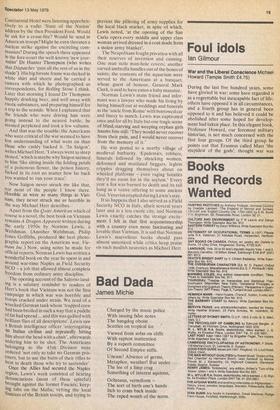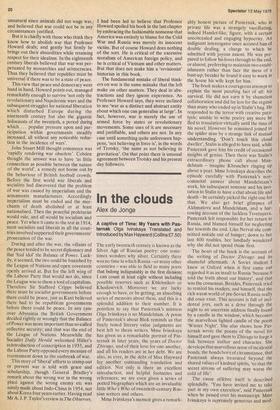Foul idols
Ian Gilmour
War and the Liberal Conscience Michael Howard (Temple Smith £4.75)
During the last five hundred years, some have gloried in war; some have regarded it as a regrettable but inescapable fact of life; others have opposed it in all circumstances, and a fourth group has in general been opposed to it and has believed it could be abolished after some hoped for development had taken place. In this elegant book, Professor Howard, our foremost military historian, is not much concerned with the first four groups. Of the third group he points out that Erasmus called Mars 'the stupidest of the gods', thought war was unnatural since animals did not wage ward and believed that war could not be in any circumstances justified.
But it is chiefly with those who think they know how to abolish war that Professor Howard deals; and gently but firmly he brings out their absurdities while retaining respect for their idealism. In the eighteenth century liberals believed that war was perpetuated by monarchies and aristocracies. Thus they believed that republics must be universal if there was to be a state of peace.
This view that peace and democracy went hand in hand, Howard points out, managed remarkably enough to survive 'not only the revolutionary and Napoleonic wars and the subsequent struggles for national liberation which disturbed Europe during the nineteenth century but also the gigantic holocausts of the twentieth, a period during which . . . popular pressure upon and participation within governments steadily increased, all without any noticeable reduction in the incidence of wars'.
John Stuart Mill thought commerce was 'rapidly rendering war obsolete'. Cobden thought the answer was to have 'as little connection as possible between the nature of the world', a remedy not borne out by the behaviour of British football crowds. Before the first world war liberals and socialists had discovered that the problem of war was caused by imperialism and the armaments manufacturers. Accordingly imperialism must be ended and the merchants of death abolished or at least nationalised. Then the peaceful proletariat would rule, and all would be socialism and peace. Yet when it came to the test in 1914, most socialists and liberals in all the countries involved supported their governments' prosecution of the war.
During and after the war, the villains of the peace tended to be secret diplomacy and that 'foul idol' the Balance of Power. Luckily, it seemed, the two could be banished by the League of Nations and open covenants openly arrived at. But for the left wing of the Labour Party that would not do, since the League was to them a tool of capitalism. Therefore Sir Stafford Cripps believed there must be socialist governments before there could be peace, just as Kant believed there had to be republican governments before there could be peace. In any case over Abyssinia the British Government decided rightly or wrongly that the Balance of Power was more important than so-called collective security; and that was the end of the League of Nations. Meanwhile the Socialist Daily Herald welcomed Hitler's reintroduction of conscription in 1935, and the Labour Party opposed every measure of rearmament down to the outbreak of war.
This story of 'liberal' efforts to stamp out or prevent war is told with grace and scholarship, though General Bradley's remark about the wrong war in the wrong place against the wrong enemy etc was surely made about Indo-China in 1954, not about Korea four years earlier. Having read Mr A. J. P. Taylor's review in The Observer, I had been led to believe that Professor Howard spoiled his book in the last chapter by embracing the fashionable nonsense that America was entirely to blame for the Cold War and Russia was merely its innocent victim. But of course Howard does nothing of the sort. He is critical of the excessive moralism of American foreign policy, and he is critical of Vietnam and other matters. But that does not make him a 'revisionist' historian in this book.
The fundamental mistake of liberal thinkers on war is the same mistake that the left make on other matters. They deal in abstractions and they ignore experience. As Professor Howard says, they were inclined to see 'war as a distinct and abstract entity about which one can generalise at large'. In fact, however, war is merely the use of armed force by states or revolutionary movements. Some uses of it are necessary and justifiable, and others are not. In any case until something quite unforeseen happens, 'not believing in force is', in the words of Trotsky, 'the same as not believing in gravitation'. On that point there is unusual agreement between Trotsky and his present day followers.



































 Previous page
Previous page